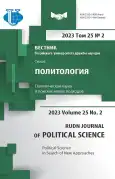Проблема размежевания на левых и правых в современной России через призму социального конструктивизма
- Авторы: Жигадло К.В.1
-
Учреждения:
- Национальный исследовательский университет «Высшая школа экономики»
- Выпуск: Том 25, № 2 (2023): Политическая наука в поисках новых подходов
- Страницы: 423-433
- Раздел: ПОЛИТИЧЕСКИЕ ФЕНОМЕНЫ И СТРАТЕГИИ
- URL: https://journal-vniispk.ru/2313-1438/article/view/322234
- DOI: https://doi.org/10.22363/2313-1438-2023-25-2-423-433
- EDN: https://elibrary.ru/PGJXDU
- ID: 322234
Цитировать
Полный текст
Аннотация
К началу 2010-х гг. в Российской Федерации сложились партийная система и электоральная культура, для которых идеология как таковая и идеологический спектр не обладают критически важным значением. Однако громкие политические процессы и события последних лет и скачок в развитии социальных медиа поспособствовали реактуализации идеологического спектра в сфере неконвенциональной политики, а также формированию ряда новых социальных движений. В связи с этим вновь актуальными становятся вопросы о размежеваниях на левых и правых и о смысловом наполнении самих этих понятий. Автор статьи предпринимает попытку определить, какие российские идеологические и социальные движения, политические партии и объединения иного типа сегодня можно отнести к левым, а какие - к правым и в чем сегодня состоят сущностные размежевания между разными сторонами лево-правого континуума. Для этого проведен дискурс-анализ публикаций ряда лидеров общественного мнения, прямо относящих себя к тому или иному лагерю, в социальных медиа. Для анализа также были использованы различные интервью и выступления этих лиц, а также программные документы некоторых партий и движений. С целью четкой идентификации различных персоналий и групп по признаку принадлежности к той или иной части идеологического спектра в ходе исследования автор опирался на методологию социального конструктивизма. Автор приходит к выводам о том, что устоявшаяся в отечественной политической науке концептуализация понятия «правые», относившая его преимущественно к либералам, к настоящему моменту во многом устарела, а также о наличии расколов внутри самих левого и правого движений по линии отношения к государству и этатизму - не менее острых и фундаментальных, чем непосредственное размежевание между этими движениями.
Об авторах
Константин Викторович Жигадло
Национальный исследовательский университет «Высшая школа экономики»
Автор, ответственный за переписку.
Email: kzhigadlo@hse.ru
ORCID iD: 0000-0001-5138-3601
аспирант Аспирантской школы по политическим наукам, cтажер-исследователь Научно-учебной лаборатории политико-психологических исследований
Москва, Российская ФедерацияСписок литературы
- Bobbio, N. (1996). Left and Right: The significance of a political distinction. Cambridge: Polity Press, 60–71.
- Clement, K. (2021). Patriotism from below. “How is it possible for people to live so poorly in a rich country?”, (pp. 153–162). Moscow: New Literary Review (In Russian).
- Dumler, D.A. (2021). Political and civic identity of libertarians in contemporary Russia: Problems and perspectives. RUDN Journal of Political Science, 23(4), 560–569. (In Russian). https://doi.org/10.22363/2313-1438-2021-23-4-560-569
- Kapustin, B.G. (1996). Ideologies of modern Russia: search for the conjugation modality. The ethics of success, (7), 60–80. Retrieved from https://www.tyuiu.ru/wp-content/uploads/2012/03/Etika-uspeha.-Vypusk-7.pdf (In Russian)
- Kapustin, B.G. (2000) Ideology and politics in post-communist Russia (pp. 115–129). Moscow: Editorial URSS, (In Russian).
- Kochetkov, V.V. (2010). Identity in international relations: Theoretical foundations and role in world politics. Moscow University Bulletin. Series 25: International Relations and World Politics, (1), 5–26 (In Russian).
- Malinova O.Y. (2013). Changing institutional conditions of production and competition of political ideas in Russia: from the 1990s to the 2010s. In E.R. Yarskaya-Smirnova & P.V. Romanov (Eds.), Public sphere: theory, methodology, case study. (pp. 55–74). Moscow: OOO “Variant”: TSPGI. (In Russian).
- Malinova, O.Y. (2017). The construction of “liberalism” in post-Soviet Russia. The legacy of the 1990s in the ideological battles of the 2000s. Politeia, 1(84), 6–28. (In Russian).
- Pain, E., & Nikiporets-Takigawa, G. (2016). Internet and ideological movements in Russia. Moscow: New Literary Review. (In Russian).
- Schwarzmantel, J. (2008). Ideology and politics. SAGE Publications Ltd, https://dx.doi.org/10.4135/9781446213247 (In Russian).
- Sergeev, S.A., & Kuznetsova, A.V. (2022). Shards of shattered world: Neo-Stalinists and neo-Trotskyists in modern Russia. Political Expertise: POLITEX, 18(2), 169–182. https://doi.org/10.21638/spbu23.2022.204 (In Russian).
Дополнительные файлы









